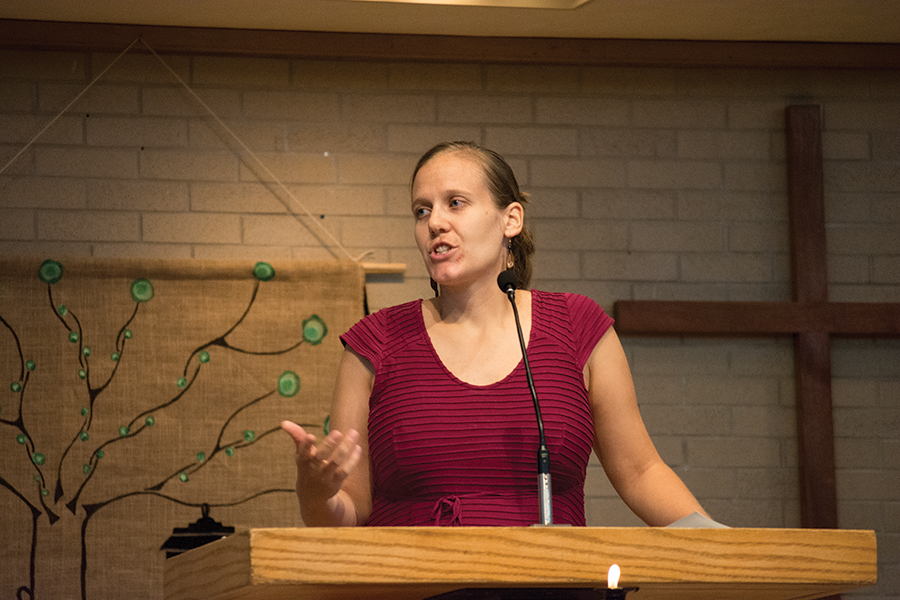On Wednesday morning, Jes Buller took the stage for a special convocation on her peacebuilding work in Colombia, where she lived for the past seven and a half years.
Throughout her speech, Buller used the metaphor of a seed to reflect her spiritual growth; when she left college she had an idea of the kind of work she wanted to do, but no long-term structured plan. Her boss in Colombia had a saying: “Any individual seed has the knowledge to become a full tree.”Buller graduated from Goshen College in 2008, with a double-major in Bible/Religion/Philosophy and Sociology. She left for Colombia that next January.
“I think my SST experience and other cross-cultural experiences had a lot to do with interest in MCC,” Buller said. “I was anxious to live in Latin America and work among a population that had been affected by violence.”
For the first two years, Buller participated in Seed, a program through MCC that offers young adults a time for reflection and service while working for peace in communities experiencing poverty and oppression. During this time she lived in a small town on the Caribbean coast of Colombia, working with a local church and doing community organizing and peacebuilding trainings.
“It really began me on the path of peacebuilding work,” Buller said of her time with MCC. “I knew I was passionate about [this work], but wouldn’t have said it would be my career. I learned a huge amount from the communities I worked with. Their consistent faith that peace could come, and persistent work to change a violent and corrupt system, inspired me in my own work. I have so many close friends who are amazing leaders working at peace in Colombia.”
After her two years with the Seed program were finished, she made the decision to stay in Colombia, working with MCC for another three years with the same partner. This was a harder call to make then her initial service placement; with Seed it was shorter-term and directly after college, when many of her peers were also pursuing short-term service opportunities.
Once this second period came to a close, she stayed on as a local hire, once again continuing with the same community organization. She felt at home in her community and strong in her work. The town and the people in it were beginning to bloom— a clear testimony to the peace-building at play.
Buller also managed to keep close ties with friends and family back home through regular visits. Many also reciprocated and travelled to Colombia. She eventually married a Colombian, creating an even more immediate bond between herself and the country
However, an unforeseen circumstance led to Buller eventually having to move back to Goshen. In March of 2015, while still in Colombia, Buller was in a motorcycle accident resulting in a broken femur, burns, and other significant damage. Due to the resulting infection, her leg is still recovering— two and a half years later.
“My accident was a huge turning point in my life,” Buller said, “I had to completely freeze the work I was doing and learn to delegate in ways I’ve never done before. I couldn’t get out to rural communities that I weekly visited, and I didn’t have the energy or physical stamina to work full-time for a good while, so the nature of my work took a huge shift.”
For the time being, Buller and her husband are back in the States, seeking better medical care and waiting out the healing process. They bought a house together in February and are expecting their first child.
Buller has taken a position with MCC as national peace education coordinator and is coaching volleyball at Bethany Christian High School.
The demographic she works with is now much different than the one she worked with in Colombia and this transition has been by no means an easy one for Buller. She is still learning to accept her new role, but finds joy in seeing churches in the U.S. teaching their children about the significance of peace work.
Additionally, Buller has a calm assurance that this is not a permanent move for her and her family.
“While we are content in the US right now,” Buller said, “Colombia is half our home and we know we will be back at some point in the future.”



